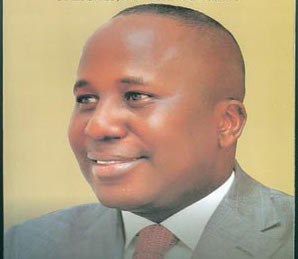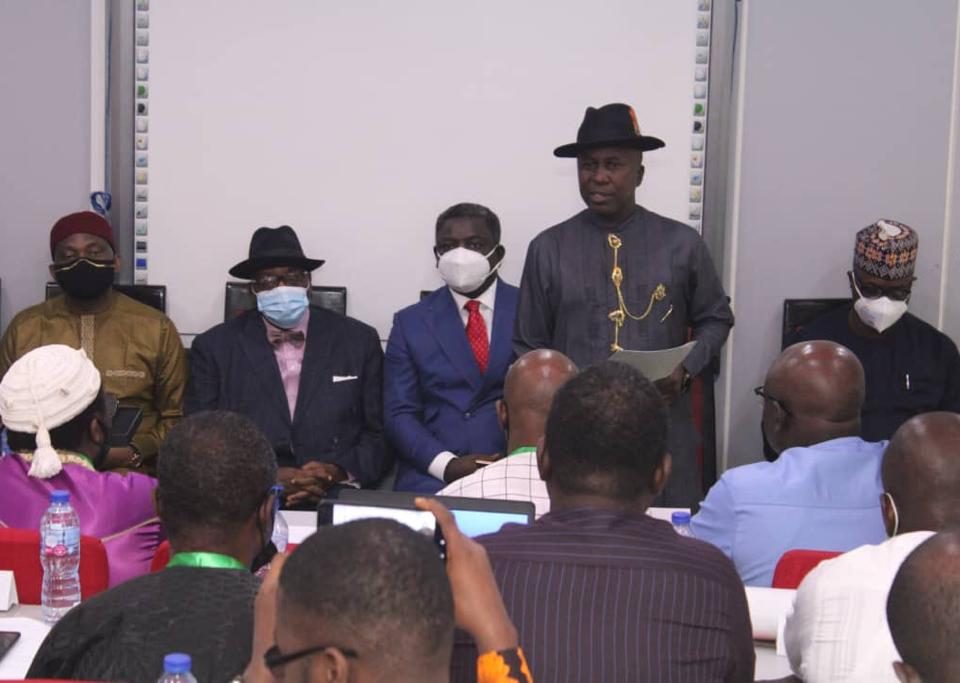
Uge-Adiafa Festival at Ikolo Village
July 14, 2015
Azaiki’s gift to public discourse
July 31, 2015Thoughts on Nigeria is an extremely ambitious project that attempts not just to find a panacea to Nigeria’s heart-wrenching difficulties, but also to provide a robust conversation around engaging global issues, writes Solomon Elusoji
Discussing Nigeria is a difficult task to embark on; Africa’s most populous nation carries with her humongous issues, diverse in their nature, which have both extensive local and global implications on the form of history. But that’s exactly what Professor Steve Azaiki attempted in his latest book
‘Thoughts on Nigeria: Speeches, Letters and Essays’. He plunged deep into the mathematics of the country’s politics, and the wide-ranging social and economic issues assailing the nation in the 21st century.
Azaiki is a man that should be listened to. A recipient of Nigeria’s national honour (OON), he is the president of the International Society of Comparative Education, Science and Technology Nigeria (ISCEST) and serves on the governing boards/councils of organisation, including the Federal University of Technology, Akure. He is a visiting professor and fellow to a number of institutions, including Institute of Petroleum Studies, University of Port Harcourt. Also, he is currently the coordinator, National Think Thank Nigeria.
To be sure, the book’s blurb describes it as “an intellectual companion, a collective story of Nigeria’s challenges, progress and people. The book has chronicled various happenings in Nigeria in the last few years, especially on politics and governance, corruption and Nigeria’s missed opportunities. The book also tells the story of influential figures in the history of Nigeria, culture, education, politics and governance.
“A collection of essays, articles and speeches, it documents the acts of terrorism by Boko Haram, youth, education and also covers inspirational stories of some notable individuals in our society and dominant issues in the Nigerian discourse.”
The book is divided into five major parts. The first part is focused on Governance and Politics, where Azaiki touches on several pertinent issues pertinent to the survival of the nation’s architecture. He makes a general acknowledgement of the difficult problems facing Nigeria, but also oozes confidence, that with the right set of leaders, there is hope.
In this first part, he presented speeches that focused extensively on National Think Thank Nigeria, an organisation which Azaiki believes will “strengthen economic and political reforms which are the compass of a new world order, as well as the rapid integration of the country into global economies.
Through this, we hope the country would achieve genuine liberalisation and deregulation, free flow of capital and up-to-date information technology as vehicles to take us to the Promised Land.”
The second part of the book is about the Niger Delta. In ‘Confronting Poverty and Social Insecurity in the Niger Delta’, a paper he co-presented at Harvard School of Business Studies, Azaiki writes that “there is a wide mismatch and gulf between the promise and the practice of the social programmes initiated. Outlays are not outcomes. Year after year, budgets, which make up allocations for the poor and programmes initiated with good intentions of assisting the poor, often lead to perverse outcomes.
The failure of social expenditure to reach the poor and people of the Niger Delta is the collective failure of the neo-liberal market model, the polity, and the society.”
Azaiki’s prose is clear, sharp and crisp. His penchant for presenting ideas intelligibly and providing adequate background with well researched facts and figures makes Thoughts on Nigeria a fascinating reading. The section on the Niger Delta, perhaps, underlines this point more.
The third part focused on tributes to several prominent and national leaders like Abdusalami Abubakar, Shehu Shagari, and others. He describes former Presidents Olusegun Obasanjo as “a great diplomat’ and Goodluck Jonathan as “a man of transparent honesty and humility; a perfect gentleman, a tender loving husband, father and an unshakable believer in the unity of Nigeria.”
The fourth section deals with international and contemporary issues such as an analysis of Dan Brown’s Da Vinci Code. A Christian by religion, Azaiki, while acknowledging the fascinating literary effort of Brown, believes the book’s core claims are based on specious sources of history. He concludes: “It is amazing how many people took that book literally and think it is true. How many more Da Vinci’s would Christianity contend with before the end of time? Christians awake. The truth, as contained in the Bible: Jesus Christ was never married to Mary Magdalene, never had a daughter named Serah.”
In this section, Azaiki displays profound scholarship curiosity and a painstaking approach towards unravelling the truth. Although he holds a PhD in Agriculture and is currently a Professor of Plant Protection in Agronomy at the Institute of Potato Research, Ukrainian Academy of Agricultural Sciences, his interests are extensive and reek of intellectual curiosity.
In a 2006 piece published in The Guardian, ‘The Challenge of China’, Azaiki writes: “China’s increasingly aggressive competition with the West for Africa’s economic space represents both an opportunity and a challenge to Africa in general and to Nigeria in particular. The opportunity is inherent in Africa being able to choose between options presented either by the traditional West or by China, and in being able to negotiate the best deals in the circumstance.”
He surmises that “we must not take China for granted, nor assume that its current and growing global status is a happenstance . . . we must examine the critical success factors in China’s leap to global prominence and then seek to domesticate those relevant factors, lest we continue to lag behind.”
One of the most moving pieces in the book is the piece ‘Let Mandela Go’ published on the Scoop in 2013. “Africa could not have wished for a prouder son,” Azaiki writes. “To the extent that history will always be a relevant subject in the future, the history of the world will not be complete without a discourse of Nelson Mandela. He was the rallying point for the emancipation of South Africa from the settler-colonialists, who sought to enslave the indigenous people in the land of their birth.”
The final part of the book is a quick compendium of some of the interviews the author has given over the years, where he discusses a plethora of topics, ranging from how he felt after being awarded a national honour, and what he thinks about solving the problems of the Niger Delta. In short, Azaiki’s thoughts on these issues are precious and are worth the paper it is printed on. It is a book every Nigerian should read.
Writing the preface to the book, the first executive president of Nigeria, Shehu Shagari points out that the purpose of Azaiki’s ‘Thoughts on Nigeria’ “is to document history and a particular period in our history. Those who did not read these publications in the newspapers or hear Prof. Azaiki speak will now have the great opportunity of seeing all these in one book. This is the beauty.”
He adds: “This book is Nigeria incorporated. Let us read it. Let us enjoy it. Let us use it to grow this country to greatness and prosperity. I am happy that a new thought process and mindset is springing up in my lifetime – men and women who are ready to make and accept change, Nigerians who are ready and able to speak for the majority who cannot do so themselves.”
Shagari is right. The 546 page text is sprinkled with quotations from notable figures in history, a technique which Azaiki uses successfully in providing context and coaxing his readers into a position where his convictions can be perfectly conveyed without sounding arrogant or high-minded. History will remember him for having left a treasure behind for coming generations.
Solomon Elusoji
http://www.thisdaylive.com/articles/azaiki-s-thoughts-on-nigeria/214609/


